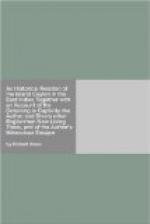[The Original of Chingulays.] I have asked them, whence they derive themselves, but they could not tell. They say their Land was first inhabited by Devils, of which they have a long Fable. I have heard a tradition from some Portugueze here, which was; That an antient King of China had a Son, who during his Fathers Reign, proved so very harsh and cruel unto the people, that they being afraid he might prove a Tyrant if he came to the Crown, desired the King to banish him, and that he might never succeed. This that King, to please the people, granted. And so put him with certain Attendants into a ship, and turned them forth unto the Winds to seek their fortune. The first shore they were cast upon, was this Island. Which they seated themselves on, and peopled it. But to me nothing is more improbable than this Story. Because this people and the Chineses have no agreement nor similitude in their features nor language nor diet. It is more probable, they came from the Malabars, their Countrey lying next, tho they do resemble them little or nothing. I know no nation in the world do so exactly resemble the Chingulays as the people of Europe.
[Wild-men.] Of these Natives there be two sorts, Wild and Tame. I will begin with the former. For as in these Woods there are Wild Beasts so Wild Men also. The Land of Bintan is all covered with mighty Woods, filled with abundance of Deer. In this Land are many of these wild men; they call them Vaddahs, dwelling near no other Inhabitants. They speak the Chingulayes Language. They kill Deer, and dry the Flesh over the fire, and the people of the Countrey come and buy it of them. They never Till any ground for Corn their Food being only Flesh. They are very expert with their Bows. They have a little Ax, which they stick in by their sides, to cut hony out of hollow Trees. Some few, which are near Inhabitants, have commerce with other people. They have no Towns nor Houses, only live by the waters under a Tree, with some boughs cut and laid round about them, to give notice when any wild Beasts come near, which they may hear by their rustling and trampling upon them. Many of these habitations we saw when we fled through the Woods, but God be praised the Vaddahs were gone.
[By an Acknowledgment to the King.] Some of the tamer sort of these men are in a kind of Subjection to the King. For if they can be found, tho it must be with a great search in the Woods, they will acknowledg his Officers, and will bring to them Elephants-Teeth, and Honey, and Wax, and Deers Flesh: but the others in lieu thereof do give them near as much, in Arrows, Cloth &c. fearing lest they should otherwise appear no more.
[How they bespeak Arrows to be made them.] It hath been reported to me by many people, that the wilder sort of them, when they want Arrows, will carry their load of Flesh in the night, and hang it up in a Smith’s Shop, also a Leaf cut in the form they will have their Arrows made, and hang by it. Which if the Smith do make according to their Pattern they will requite, and bring him more Flesh: but if he make them not, they will do him a mischief one time or another by shooting in the night. If the Smith make the Arrows, he leaves them in the same place, where the Vaddahs hung the Flesh.




